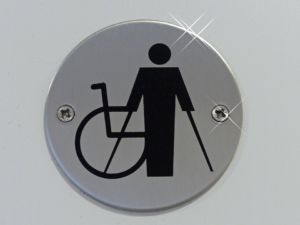 If you’re an employee with a disability, trust can be a huge issue. If you tell someone about it, who else will know? Might you suffer as a result?
If you’re an employee with a disability, trust can be a huge issue. If you tell someone about it, who else will know? Might you suffer as a result?
If you need an accommodation to your disability for you to perform an essential function of your job, you don’t have a choice. You need to disclose that disability to your employer so it can evaluate your request. Any medical information about you should be kept separate from your personnel file and kept confidential. Each employer should have a policy as to how this process plays out and whom you should notify of your request.
The Ignorance Is Bliss Defense
 From a personal standpoint, you may want fewer people in management to know about your disability, but from a legal standpoint, you want everyone in your chain of command, including human resources, to know.
From a personal standpoint, you may want fewer people in management to know about your disability, but from a legal standpoint, you want everyone in your chain of command, including human resources, to know.
- In disability lawsuits, one possible defense against a claim of discrimination is that management was unaware of the disability.
- Management can’t make negative employment discrimination decisions because of your disability if they are unaware of it.
If your disability is obvious or openly discussed, this is less of an issue. However, if you have an obvious disability and are hired, in most cases, it’s harder to claim you suffered due to employer bias against that disability since it didn’t stop you from being hired. If there is a management change and you were doing well with your first manager but your situation takes a dramatic downturn under a new manager, that’s a situation more favorable to a disability claim.
Restaurant Manager Claims He Was Forced to Resign Because of Disability Discrimination
One instance where this defense was successfully used was a legal action filed by Clarence Cosby against Steak N Shake. His lawsuit was filed in Missouri state court, then removed to federal court, where Cosby’s case was dismissed prior to trial. That dismissal was upheld by the U.S. Court of Appeals for the Eighth Circuit.
- Cosby was the general manager of a Steak N Shake restaurant in St. Louis in 2010. Cosby’s supervisor, his district manager, testified he discussed performance problems with him numerous times; he addressed absences, not holding employees accountable, and high employee turnover.
- Cosby was given two written warnings in September and October. The defendant claimed the second warning stated the district manager told him he would lose his general manager position. Cosby disputed that, suggesting that he was told he would be demoted if his store did not improve.
- Also disputed was whether Cosby met with his district manager and a human resources manager on November 3 and whether he was told he would be demoted as of November 17.
Starting November 8, Cosby didn’t show up for work for nine days of scheduled shifts. On November 16, he faxed a short-term disability claim to his employer’s benefits department. His physician’s opinion was stated on the form, which was that Cosby was “unable to perform management or line staff duties” due to major depression. Cosby said he previously told the general manager of his diagnosis, but the employer stated this disability claim was the first it learned of his depression.
Cosby was given 60 days of leave starting November 8. He was demoted from general manager to store manager on November 17 and assigned a different restaurant, though he was being supervised by the same district manager.

Quitting Your Job Won’t Help Your Legal Claims
Cosby returned to work in January 2011. Management claimed that his poor performance continued and that he received additional warnings.
- In August 2011, he received a written warning. Cosby stated he asked the human resources manager about his future, and the manager reportedly laughed.
- Cosby told the district manager he was considering resigning, and Cosby was told that “this” scrutiny would continue if he stayed. He resigned minutes later.
- After learning of the resignation, the human resources manager allegedly told another employee, “This is perfect!” and that Cosby’s departure was a “HUGE plus.”
When the Eighth Circuit reviewed Cosby’s case, it agreed there were grounds to dismiss the case, even when viewing the facts in a light most favorable to the plaintiff. It found:
- The evidence did not show that his disability was a contributing factor in his demotion because the employer had no knowledge of Cosby’s disability at the time it decided to demote him (which was prior to his application for disability benefits).
- There was a November 3 meeting when Cosby was told of the future demotion. Cosby had no evidence it didn’t occur, the defendant’s human resources manager’s calendar listed the meeting, and Cosby signed a letter stating that he had in fact attended the meeting.
The appellate court also found there was no constructive discharge (the working conditions were so extreme and intolerable a reasonable person would quit).
- The written performance warnings that he received were discipline in accordance with an employment policy, which was insufficient for a constructive discharge claim under Missouri state law.
- “[C]onsiderably more proof than an unpleasant and unprofessional environment” was needed for the claim, above and beyond the human resources manager’s laughter when he asked about his future and the district manager’s statement that “this” would continue if he didn’t resign.
- The appellate court also wrote that the defendant didn’t have a reasonable opportunity to resolve the issues Cosby had with the human resources manager or his district manager because he never complained about them to the company prior to resigning.
Summing It Up
If you are a disabled employee and need an accommodation, you need to disclose that disability to your employer.
- For legal reasons, if you must disclose, it’s a good idea to inform all of those in your chain of command, plus human resources, and document that communication.
- If things go bad and you are later targeted for discrimination, that documented disclosure should help your case since your employer can’t deny knowledge of your disability.
Also, as Cosby’s case shows, you should not quit, if possible. Proving you were fired for discriminatory reasons will be easier than showing your work conditions were so intolerable it justified quitting your job.
If you feel you’ve been discriminated against because of your disability, contact our office so we can talk about the situation, about how the law may apply, and about your best options to protect your interests and legal rights.





